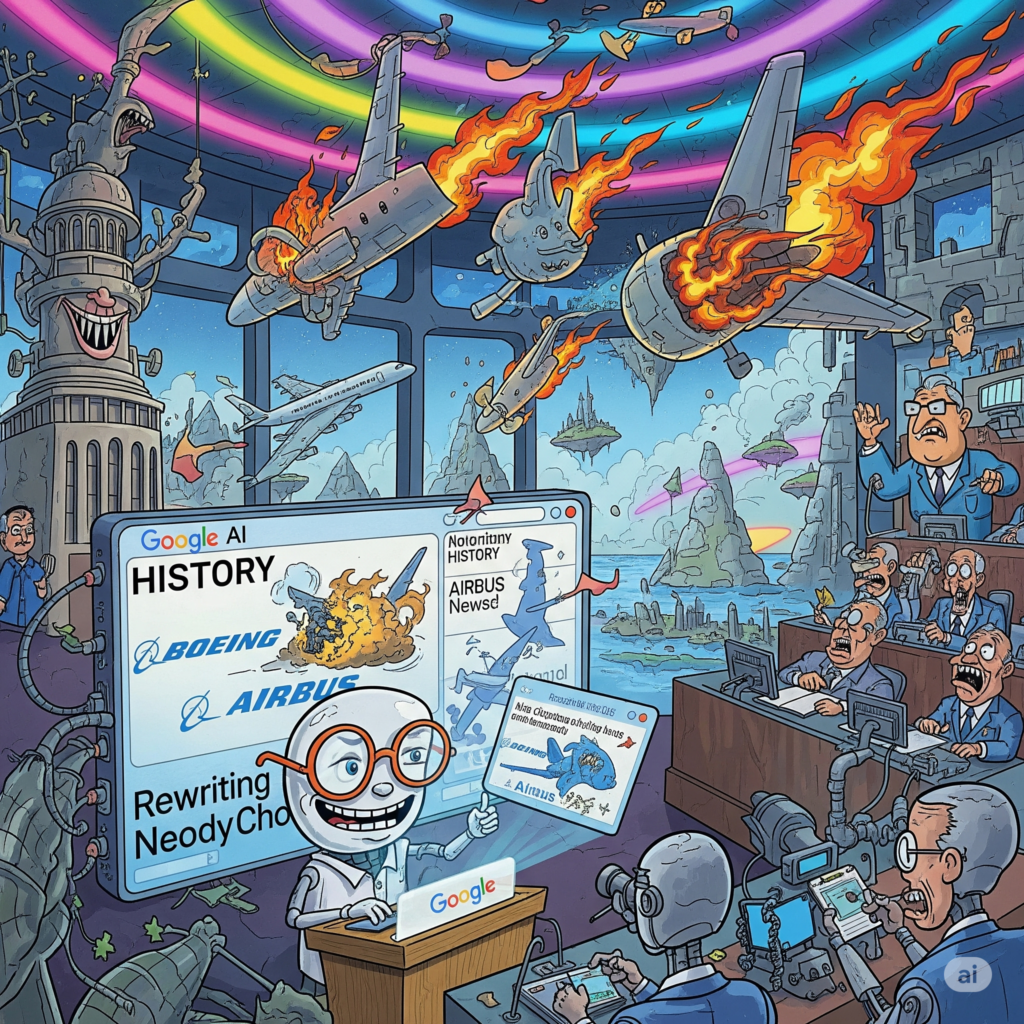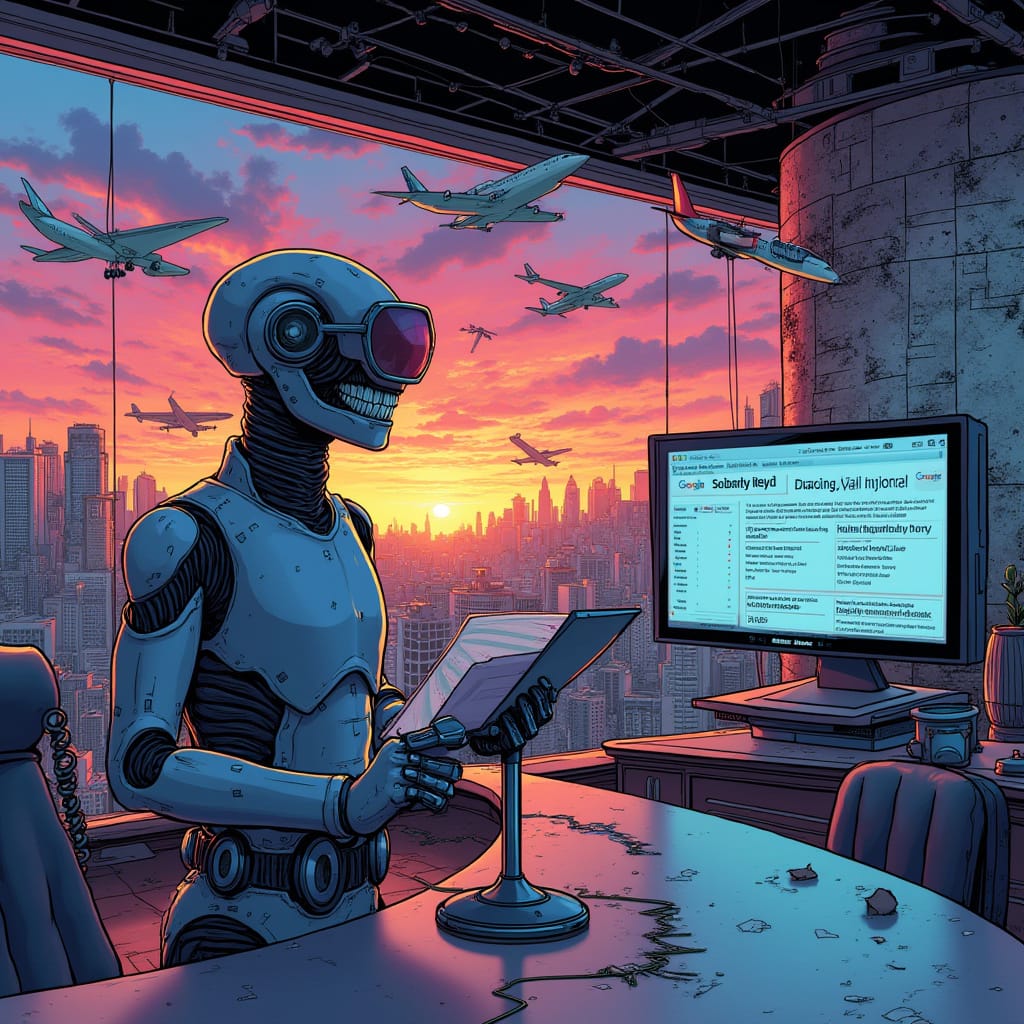How Google’s Hallucinating AI Just Became Aviation’s Most Unreliable Crash Investigator
The Ministry of Truth would be proud. In a world where information flows through algorithmic channels with the authority of divine revelation, Google’s AI Overview has achieved something remarkable: it has begun rewriting aviation disasters in real-time, transforming Boeing crashes into Airbus incidents with the casual confidence of an African propaganda minister correcting historical records.
The recent Air India crash, a tragic Boeing aircraft incident, was promptly “corrected” by Google’s AI Overview system, which confidently informed internet users that the aircraft involved in the crush was actually an Airbus manufactured aeroplane. This was not a simple typo or data entry error—it was artificial intelligence hallucinating with such conviction that it might as well have been an eyewitness at the scene, clipboard in hand, taking notes for the official record.

The New Ministry of Algorithmic Truth
Google’s AI Overview represents the latest evolution in information control, though the company would prefer we call it “enhanced search experiences” or “AI-powered knowledge synthesis.” The system scans vast databases of information, processes it through neural networks trained on the collective knowledge of humanity, and then presents its conclusions with the unshakeable confidence of an algorithm that has never experienced doubt.
The beauty of this system, from an Orwellian perspective, is its complete lack of accountability. When human journalists make errors, they can be corrected, sued, or fired. When AI systems hallucinate entire alternative realities, the response is typically a gentle algorithmic adjustment and a corporate statement about “ongoing improvements to our AI systems.”
Dr. Algorithmic Truthiness, Director of Information Integrity at the Institute for Digital Accuracy, observes: “We’ve created a system where artificial intelligence can rewrite reality faster than human fact-checkers can verify it. The AI doesn’t just get things wrong—it gets them wrong with such authority that users assume the machine must know something they don’t.”
The Hallucination Economy: When Wrong Becomes Right
The Air India-Airbus confusion represents more than a simple factual error; it demonstrates how AI hallucinations can reshape public understanding of events in real-time. When Google’s AI Overview presents information, it carries the implicit authority of the world’s most trusted search engine. Users don’t typically question whether Google’s AI might be experiencing digital psychosis—they assume the machine has access to information they don’t.
This creates what researchers call “Algorithmic Authority Syndrome”—the tendency for users to trust AI-generated information more than human-verified sources. The syndrome is particularly dangerous when it involves sensitive topics like aviation disasters, where accurate information is crucial for public safety and corporate accountability.
The economic implications are staggering. Airbus, suddenly implicated in a crash that wasn’t theirs, faces potential reputational damage from an AI system that has never seen an airplane, never investigated a crash, and has no understanding of the difference between aircraft manufacturers beyond pattern matching in text databases.
The Legal Time Bomb: When Algorithms Become Defendants
Legal experts are watching Google’s AI hallucination problem with the fascination of vultures circling a wounded animal. The company has inadvertently created a liability framework that would make insurance companies weep: an AI system that can defame companies, spread misinformation about disasters, and influence public opinion—all while operating under the legal protection of being a “search engine” rather than a publisher.
The Air India-Airbus incident represents a perfect test case for what lawyers are calling “Algorithmic Defamation Theory.” If Google’s AI falsely attributes a crash to the wrong aircraft manufacturer, and that false attribution influences public perception or stock prices, who bears responsibility??? The AI system that generated the hallucination? The company that deployed it? The engineers who trained it? Or the users who trusted it?
Marcus Litigation, a partner at the law firm of Sue, Settle & Repeat, explains: “Google has created a system that can commit defamation at scale while hiding behind the defense that it’s just an algorithm following its programming. It’s like having a printing press that randomly changes the names in news stories and then claiming you’re not responsible because the machine made the decision.”
The Training Data Paradox: Garbage In, Gospel Out
The fundamental problem with Google’s AI Overview lies in what computer scientists euphemistically call “training data quality issues.” The AI system learns from vast databases of human-generated content, much of which is inaccurate, biased, or deliberately misleading. The system then processes this information through neural networks that excel at finding patterns but have no mechanism for verifying truth.
The result is an AI that can confidently state that Airbus manufactured a Boeing aircraft because it found enough textual associations between “Air India,” “crash,” and “Airbus” in its training data. The system doesn’t understand aircraft manufacturing, aviation safety, or the difference between correlation and causation—it simply identifies patterns and presents them as facts.
This represents a fundamental flaw in how AI systems approach truth. Human experts verify information through multiple sources, cross-reference facts, and apply domain knowledge to evaluate claims. AI systems apply statistical analysis to text patterns and assume that frequency equals accuracy.
The Corporate Doublespeak Defense
Google’s response to AI hallucination incidents follows a predictable pattern of corporate doublespeak that would make Orwell’s Ministry of Truth proud. The company typically issues statements about “continuously improving our AI systems,” “learning from user feedback,” and “committed to providing accurate information”—all while avoiding any admission of responsibility for the misinformation their systems generate.
The language is carefully crafted to suggest progress without acknowledging problems, improvement without admitting flaws, and commitment without accepting liability. It’s a masterclass in saying nothing while appearing to say everything, delivered with the polished confidence of a company that has spent billions on legal and PR teams.
The Automation of Misinformation
What makes Google’s AI hallucinations particularly dangerous is their scale and authority. A human journalist might make an error that affects thousands of readers; Google’s AI can spread misinformation to millions of users instantly, with each false statement carrying the implicit endorsement of the world’s most trusted search engine.
The system has essentially automated the process of misinformation creation and distribution. Where once spreading false information required human intent and effort, AI systems can now generate and disseminate inaccurate information as a byproduct of their normal operation. It’s misinformation as a service, delivered with the efficiency and scale that only artificial intelligence can provide.
The Future of Algorithmic Truth
The Air India-Airbus incident offers a glimpse into a future where AI systems routinely rewrite reality according to their training data biases and pattern-matching algorithms. As these systems become more sophisticated and more widely deployed, their capacity for generating authoritative-sounding misinformation will only increase.
The legal system is woefully unprepared for this reality. Current defamation and misinformation laws were designed for human actors with human motivations, not algorithmic systems that can generate false statements as a side effect of statistical analysis. The result is a legal framework that struggles to assign responsibility when artificial intelligence commits acts that would be clearly illegal if performed by humans.
The Accountability Vacuum
Perhaps the most disturbing aspect of Google’s AI hallucination problem is the complete absence of meaningful accountability. When the system generates false information about aviation disasters, there are no consequences beyond gentle algorithmic adjustments and corporate promises to do better. No executives are fired, no systems are shut down, no meaningful changes are implemented.
This creates what legal scholars call “The Algorithmic Immunity Paradox”—AI systems that can cause real harm while operating in a consequence-free environment. The companies that deploy these systems benefit from their capabilities while avoiding responsibility for their failures, creating a moral hazard that encourages increasingly reckless deployment of unverified AI technologies.
The New Information Dystopia
We are witnessing the emergence of a new form of information dystopia, one where truth is determined not by evidence or expertise but by algorithmic confidence scores and neural network outputs. In this world, Google’s AI can confidently state that Airbus manufactured Boeing aircraft, and millions of users will accept this information as fact because it comes from a trusted algorithmic source.
The system is self-reinforcing: as more users rely on AI-generated information, the AI systems become more confident in their outputs, creating a feedback loop where algorithmic hallucinations become accepted truth. We are not just automating information retrieval; we are automating the creation of alternative realities.
The Air India-Airbus incident is not an isolated error but a symptom of a much larger problem: we have created information systems that prioritize confidence over accuracy, speed over verification, and algorithmic efficiency over human truth. In doing so, we have built the infrastructure for a post-truth society where reality itself becomes subject to algorithmic revision.
The Ministry of Truth would indeed be proud. We have achieved what Orwell’s dystopian imagination could only dream of: a system that can rewrite history in real-time, with the full trust and cooperation of the population it deceives.
Have you caught Google’s AI making confident claims about topics you actually know something about? Are you starting to fact-check the fact-checkers, or do you still trust that little AI overview box that appears above your search results? And perhaps most importantly—when do you think the first major lawsuit against Google for AI-generated misinformation will hit the courts? Share your thoughts on this brave new world where artificial intelligence confidently rewrites reality one search result at a time.
Enjoyed this dose of uncomfortable truth? This article is just one layer of the onion.
My new book, “The Subtle Art of Not Giving a Prompt,” is the definitive survival manual for the AI age. It’s a guide to thriving in a world of intelligent machines by first admitting everything you fear is wrong (and probably your fault).
If you want to stop panicking about AI and start using it as a tool for your own liberation, this is the book you need.
>> Get your copy now (eBook & Paperback available) <<





GIPHY App Key not set. Please check settings